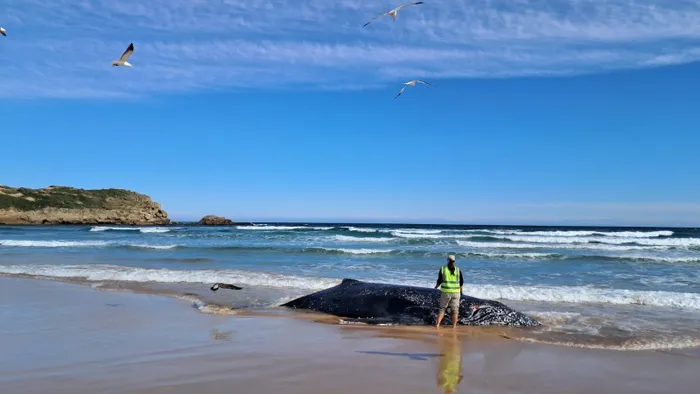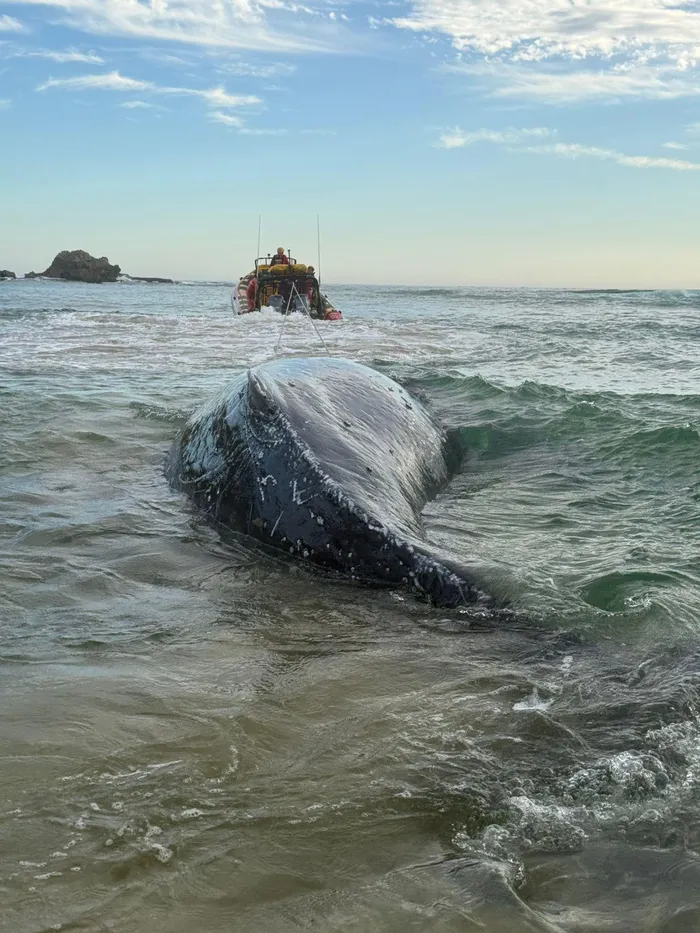Heartbreaking decision: euthanasia for stranded humpback whale at Robberg Nature Reserve

A young female Humpback whale that stranded on the Island Beach at Robberg Nature Reserve on Monday was humanely euthanised the following morning
Image: CapeNature
A young female humpback whale that became stranded on Island Beach at Robberg Nature Reserve has sadly been euthanised following multiple rescue attempts that ended in failure.
The incident unfolded on Monday, 19 May 2025, bringing together a dedicated team from the Plett Stranding Network, CapeNature, marine mammal experts, and partner organisations, including the National Sea Rescue Institute (NSRI) and the South African Police Service (SAPS).
After running aground on a sandbank, the whale, estimated to be between six and seven metres long and likely a calf from the 2023/2024 calving season, was initially assessed at the scene. Chanel Visser, a senior marine field ranger, said, “She appeared to be in good body condition, which made her a candidate for rescue. It’s possible she became stranded due to navigational error during her northward migration, or there may have been underlying health issues.”
Following consultations with whale scientist Dr Gwenith Penry and a team of rangers, an attempt to refloat the whale began. Over several hours, rescuers managed to guide the animal back into deeper waters on multiple occasions. Unfortunately, despite their best efforts, the whale repeatedly re-stranded, forcing the team to halt further attempts just before sunset.

The whale appeared to have run aground on a sandbank within the Robberg Nature Reserve.
Image: CapeNature
The challenges faced in rescuing marine mammals of this size are significant. Weighing an estimated five to six tons, the sheer weight of the whale posed considerable risks. Once stranded on land, its own weight could crush its internal organs, while dehydration, sun exposure, and trauma from the stranding could put the creature into shock. Furthermore, even post-refloat, confusion or physical inability could lead the whale to strand again.
Stranding incidents are often complex and multi-faceted. Factors such as illness, disorientation, changes in prey movement, echolocation confusion, and even underwater noise pollution contribute to the risk. The beaching of whales is rarely the result of one single cause—it's often a combination of challenges that jeopardises their safety.
By the morning of Tuesday, 20 May, the whale re-stranded, prompting the Plett Stranding Network to confront the painful decision of humane euthanasia. SAPS bomb squad expert Johan Ehlers led the operation, having extensive experience in large mammal euthanasia. Visser reflected on the decision, stating, “While deeply distressing, this was the kindest option to prevent further suffering. Drug injections are not viable for whales due to their physiology. Explosives remain the most humane method.” The process was carried out successfully.
The euthanised whale will provide invaluable contributions to scientific knowledge and conservation efforts. Blubber and muscle samples have been collected for research, supporting long-term monitoring of whale health, disease, reproduction, and threats within the marine environment. The whale’s carcass is set to be towed out to deep sea for disposal within the week.
“This incident, while heart-breaking, showcased the incredible collaboration and resilience of our network,” said Visser. “We’ve learned valuable lessons and grown both professionally and personally.” Both CapeNature and the Plett Stranding Network extend their gratitude to everyone involved in the effort, including reserve staff, volunteers, marine scientists, SAPS, and the NSRI.
Related Topics:
